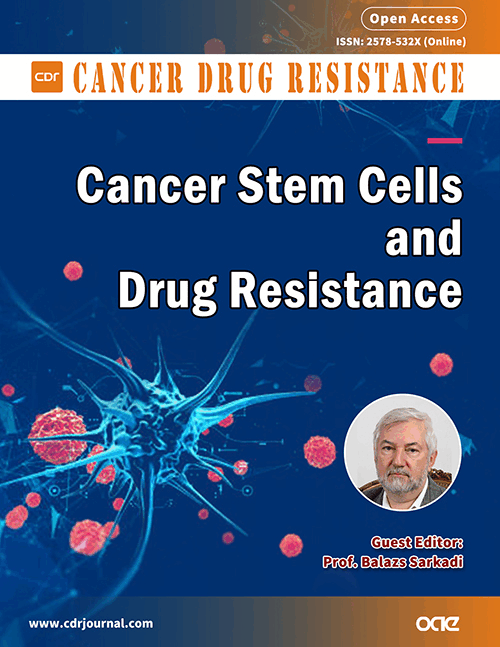
Topic: Cancer Stem Cells and Drug Resistance
Guest Editor
Special Topic Introduction
The open access journal Cancer Drug Resistance (CDR) is launching a Special Issue to specifically discuss the topic of "Cancer Stem Cells and Drug Resistance".
Successful cancer chemotherapy abolishes the bulk of proliferating tumor cells. However, a subset of remaining cancer cells in many cases survives and promotes cancer relapse, often with higher invasiveness and chemoresistance. This feature is also observed even in the case of up-to-date, properly targeted drug therapies.
Accumulating evidence suggests that a so-called cancer stem cell (CSC) population may be responsible for cancer chemoresistance, relapse and metastasis. This cell population has the ability to self-renew and differentiate into the heterogeneous lineages of cancer cells, especially in response to chemotherapeutic agents. An alternative proposal suggests the presence of drug tolerant persister (DTP) cells with special genetic features among the cancer cells, and this DTP cell population may be the source of cancer relapse. The exploration of the basic biology and the clinical features of these CSC or DTP cells may bring a new, successful era in cancer chemotherapy, including targeted therapies.
The Special Issue on "Cancer Stem Cells and Drug Resistance" provides a worldwide platform for outstanding scholars in this field to discuss and promote the scientific background and potential solutions to these major clinical problems. We also provide academically valuable resources for newcomers in this field to reveal potential breakthroughs in cancer diagnostics and therapy.
In this Special Issue:
· All submissions, after an initial editorial review, will undergo standard peer review with at least two review reports from qualified reviewers to guarantee the academic quality of the Special Issue.
· Invited and accepted manuscripts in the Special Issue will not be charged for article processing and will be published free in an open access form.
· All accepted submissions will undergo language polishing by English language experts before online publication.
· After the Special Issue is completed, the published papers will be compiled in an e-book freely accessible for the contributors.
So far, CDR has successfully launched several high-quality Special Issues. The new Special Issue on Cancer Stem Cells and Drug Resistance is expected to become an exciting academic resource with important clinical relevance.
Balázs Sarkadi,
Special Issue Editor
Successful cancer chemotherapy abolishes the bulk of proliferating tumor cells. However, a subset of remaining cancer cells in many cases survives and promotes cancer relapse, often with higher invasiveness and chemoresistance. This feature is also observed even in the case of up-to-date, properly targeted drug therapies.
Accumulating evidence suggests that a so-called cancer stem cell (CSC) population may be responsible for cancer chemoresistance, relapse and metastasis. This cell population has the ability to self-renew and differentiate into the heterogeneous lineages of cancer cells, especially in response to chemotherapeutic agents. An alternative proposal suggests the presence of drug tolerant persister (DTP) cells with special genetic features among the cancer cells, and this DTP cell population may be the source of cancer relapse. The exploration of the basic biology and the clinical features of these CSC or DTP cells may bring a new, successful era in cancer chemotherapy, including targeted therapies.
The Special Issue on "Cancer Stem Cells and Drug Resistance" provides a worldwide platform for outstanding scholars in this field to discuss and promote the scientific background and potential solutions to these major clinical problems. We also provide academically valuable resources for newcomers in this field to reveal potential breakthroughs in cancer diagnostics and therapy.
In this Special Issue:
· All submissions, after an initial editorial review, will undergo standard peer review with at least two review reports from qualified reviewers to guarantee the academic quality of the Special Issue.
· Invited and accepted manuscripts in the Special Issue will not be charged for article processing and will be published free in an open access form.
· All accepted submissions will undergo language polishing by English language experts before online publication.
· After the Special Issue is completed, the published papers will be compiled in an e-book freely accessible for the contributors.
So far, CDR has successfully launched several high-quality Special Issues. The new Special Issue on Cancer Stem Cells and Drug Resistance is expected to become an exciting academic resource with important clinical relevance.
Balázs Sarkadi,
Special Issue Editor
Submission Deadline
31 Jan 2022
Submission Information
For Author Instructions, please refer to https://www.oaepublish.com/cdr/author_instructions
For Online Submission, please login at https://www.oaecenter.com/login?JournalId=cdr&IssueId=cdr220131699
Submission Deadline: 31 Jan 2022
Contacts: Bella Zhao, Assistant Editor, [email protected]












